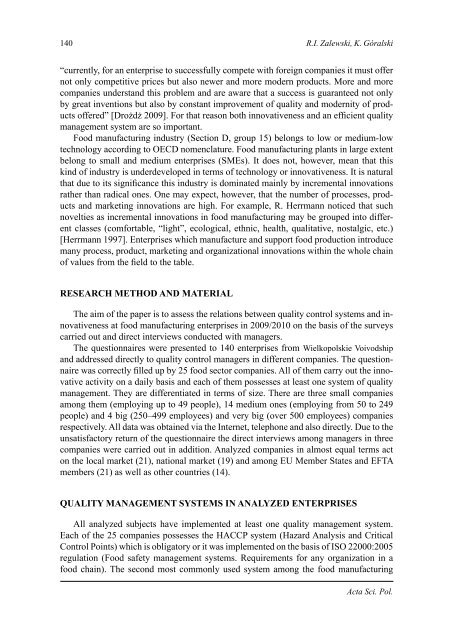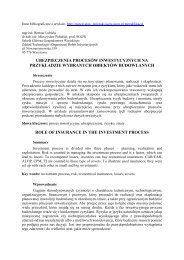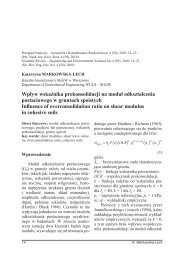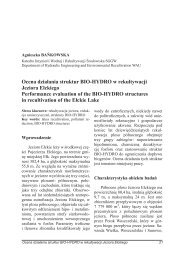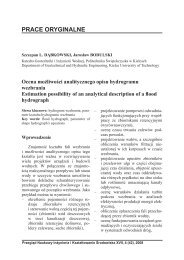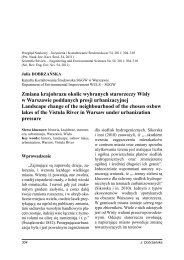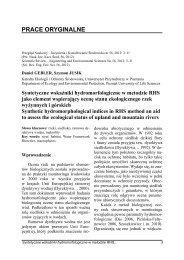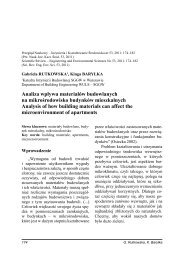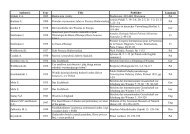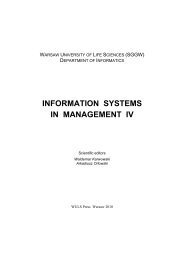ACTA SCIENTIARUM POLONORUM - SGGW
ACTA SCIENTIARUM POLONORUM - SGGW
ACTA SCIENTIARUM POLONORUM - SGGW
You also want an ePaper? Increase the reach of your titles
YUMPU automatically turns print PDFs into web optimized ePapers that Google loves.
140 R.I. Zalewski, K. Góralski“currently, for an enterprise to successfully compete with foreign companies it must offernot only competitive prices but also newer and more modern products. More and morecompanies understand this problem and are aware that a success is guaranteed not onlyby great inventions but also by constant improvement of quality and modernity of productsoffered” [Drożdż 2009]. For that reason both innovativeness and an efficient qualitymanagement system are so important.Food manufacturing industry (Section D, group 15) belongs to low or medium-lowtechnology according to OECD nomenclature. Food manufacturing plants in large extentbelong to small and medium enterprises (SMEs). It does not, however, mean that thiskind of industry is underdeveloped in terms of technology or innovativeness. It is naturalthat due to its significance this industry is dominated mainly by incremental innovationsrather than radical ones. One may expect, however, that the number of processes, productsand marketing innovations are high. For example, R. Herrmann noticed that suchnovelties as incremental innovations in food manufacturing may be grouped into differentclasses (comfortable, “light”, ecological, ethnic, health, qualitative, nostalgic, etc.)[Herrmann 1997]. Enterprises which manufacture and support food production introducemany process, product, marketing and organizational innovations within the whole chainof values from the field to the table.RESEARCH METHOD AND MATERIALThe aim of the paper is to assess the relations between quality control systems and innovativenessat food manufacturing enterprises in 2009/2010 on the basis of the surveyscarried out and direct interviews conducted with managers.The questionnaires were presented to 140 enterprises from Wielkopolskie Voivodshipand addressed directly to quality control managers in different companies. The questionnairewas correctly filled up by 25 food sector companies. All of them carry out the innovativeactivity on a daily basis and each of them possesses at least one system of qualitymanagement. They are differentiated in terms of size. There are three small companiesamong them (employing up to 49 people), 14 medium ones (employing from 50 to 249people) and 4 big (250–499 employees) and very big (over 500 employees) companiesrespectively. All data was obtained via the Internet, telephone and also directly. Due to theunsatisfactory return of the questionnaire the direct interviews among managers in threecompanies were carried out in addition. Analyzed companies in almost equal terms acton the local market (21), national market (19) and among EU Member States and EFTAmembers (21) as well as other countries (14).QUALITY MANAGEMENT SYSTEMS IN ANALYZED ENTERPRISESAll analyzed subjects have implemented at least one quality management system.Each of the 25 companies possesses the HACCP system (Hazard Analysis and CriticalControl Points) which is obligatory or it was implemented on the basis of ISO 22000:2005regulation (Food safety management systems. Requirements for any organization in afood chain). The second most commonly used system among the food manufacturingActa Sci. Pol.


